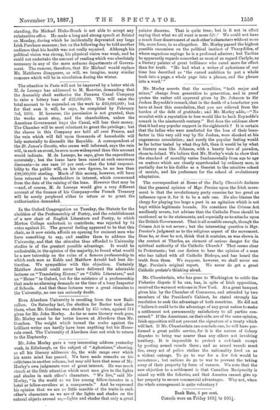Mr. Chamberlain, who has gone to Washington to settle the
Fisheries dispute if he can, has, in spite of Irish opposition, received the warmest welcome in New York. At a great banquet given him by the Chamber of Commerce, and attended by two members of the President's Cabinet, he stated. strongly his resolution to seek the advantage of both countries. He did not " believe it could be to the advantage of any great nation to make a settlement not permanently satisfactory to all parties con- cerned." If the Americans, on their side, are of the same opinion, Irish opposition will not prevent the signature of a treaty which will last. If Mr. Chamberlain can conclude one, he will have per- formed a great public service, for it is the nature of fishery disputes to bring war nearer than any others not involving territory. It is impossible to protect a cod-bank except by posting armed vessels there ; and as armed vessels must fire, every act of police strikes the nationality fired. on as a violent outrage. To go to war for a few fish would be monstrous ; but nations do go to war to prevent the taking away of their property by force of cannon. We note that the new objection to a settlement is that Canadian Reciprocity is mixed up with the fisheries, and that America cannot give up her property to secure commercial advantages. Why not, when the whole arrangement is quite voluntary P























































 Previous page
Previous page